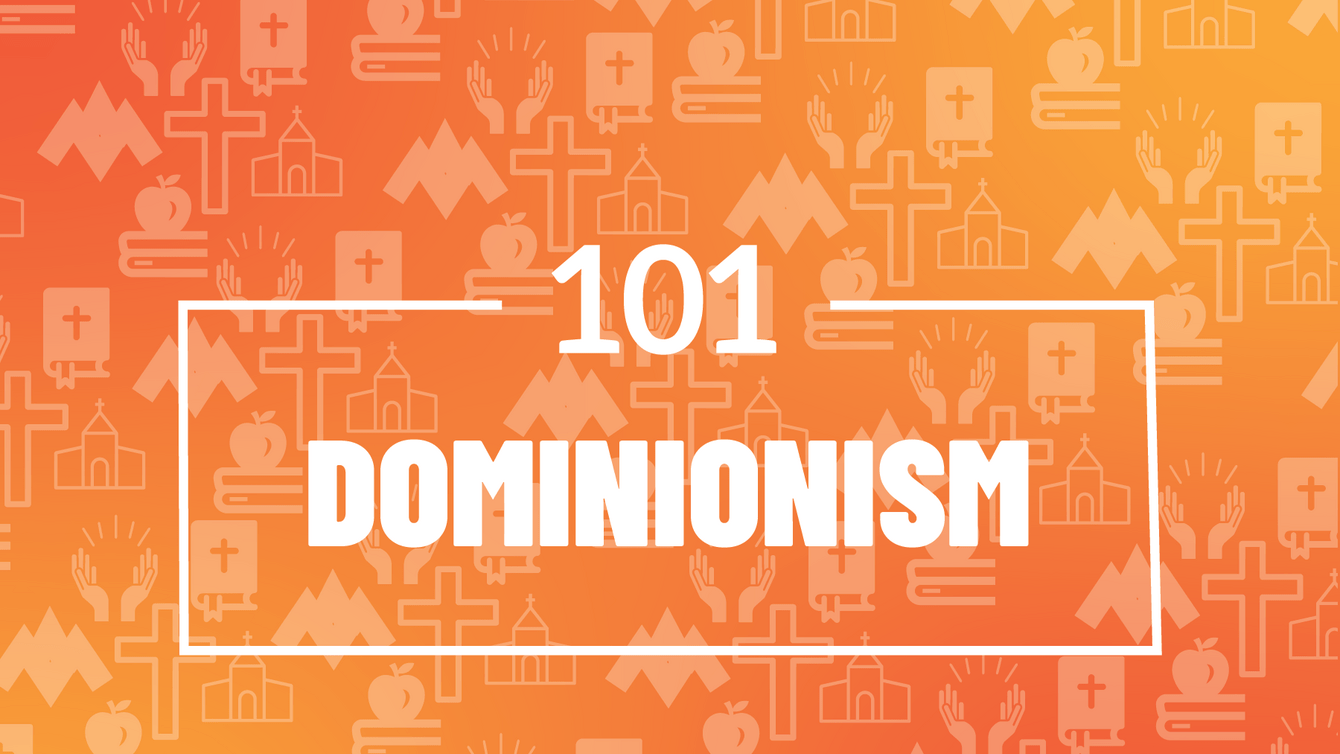101: Dominionism

Who
| The Christian Right | Major organizations and their leaders are influenced or motivated by Dominionist thought. These include the Family Research Council; the national network of state policy groups called the Family Policy Alliance; and the legal organization, Alliance Defending Freedom. Dominionist thought and its agenda are also clear in the vision and work of the smaller Congressional Prayer Caucus Foundation (CPCF) which publishes manuals containing model state legislation (originally carried out under the rubric of Project Blitz). CPCF (a non-profit strategy center) and co-sponsoring groups, Wall Builders and the National Legal Foundation, currently have a network of affiliates in approximately two dozen states. Dominionist thought and politics are on vivid display at events hosted by the Truth and Liberty Coalition (and its related broadcast and seminary), which in 2021 began training and fielding candidates for school boards in Colorado and has a vision beyond. Dominionist thought on such matters as race, gender, sexual orientation, and revisionist approaches to history also informs the curriculum and texts in most Christian private schools and home schools. |
| Elected Officials and Candidates | There are many politicians at all levels who are clearly influenced by Dominionism or overtly supported by Dominionist leaders and their followers. The Dominionist influence is not always obvious or explicitly declared. Most politicians influenced by Dominionism are Republicans, notably former Alaska Governor Sarah Palin, 2022 Pennsylvania gubernatorial candidate Doug Mastriano, and Chief Justice of the Alabama Supreme Court Tom Parker, but there are also some Democrats influenced by Dominionism, such as Florida State Rep. Kimberly Daniels. Donald Trump owed his election to Dominionist-driven Christian Right leaders, whose agenda he championed during his presidency. |
What
Since Dominionism is a comprehensive ideology intended to inform and ultimately direct all areas of life, it manifests in all of the most contentious issues of the day. Here are a few brief examples:
- The legislation at issue in the Dobbs case that led to the overturning of Roe v. Wade, was originally conceived by a Dominionist activist, Janet Porter.
- At the Family Research Council’s 2022 conference, Pray, Vote, Stand, a common refrain was how a biblical worldview shapes and informs the organization’s politics.
- Seven Mountain (7M or 7MM) strategist and promoter, Lance Wallnau, authored the popular theological justification for how morally conservative Christians could endorse Donald Trump, an openly immoral man whose Christian credentials were dubious at best. Wallnau has gone on to become a thought leader on the Christian Right and is a featured speaker at major right-wing conferences (see below for an explanation of Seven Mountains).
The Two Main Versions of Dominionism
| Christian Reconstructionism | A theocratic movement rooted in Christian nationalism which provides a blueprint for the reconstruction of society. Learn more is a theological movement centered on the work of 20th century American theologian R.J. Rushdoony. The simplest understanding might be that if America was to be a Christian nation—or if the world were to be organized according to Biblical principles, or Biblical Law—this body of work would provide a blueprint for what that America or world could look like. Rushdoony conceptualized this as the foundation, not the building. The Christian Reconstructionists have thus provided a comprehensive biblical justification for Christian involvement in politics and an approach to government and law that expanded the breadth and depth of evangelical engagement in public life. Its influence in evangelical Christianity in the 1970s—and since—made the Christian Right possible. The historic centers of Reconstructionist thought have included the Chalcedon Foundation, founded by R.J. Rushdoony, the Institute for Christian Economics founded by the late Gary North, and American Vision, led by Gary DeMar. |
| The New Apostolic Reformation (NAR) | The New Apostolic Reformation (NAR) is also called Charismatic Dominionism. This stream of Dominionism uses a mobilization strategy called the Seven Mountain Mandate, which is easy to understand because it divides seven leading areas of society that must be dominated by the correct kind of Christians: religion, family, government, education, business, arts & entertainment, and media. It springs from grafting the theocratic vision and politics of the Rushdoony camp with the strain of Dominionism that emerged from some Pentecostal and Charismatic factions with roots going back a century. The New Apostolic Reformation (NAR) was named in the mid-1990s, by the late C. Peter Wagner, a professor at Fuller Theological Seminary, who went on to help organize and lead several apostolic networks and institutions that serve as movement leadership models. Three centers of NAR thought and action are the International Coalition of Apostolic Leaders led by The leading office of the modern apostolic prayer networks that compose the New Apostolic Reformation (NAR). Learn more John P. Kelly; the U.S. Coalition of Apostolic Leaders headed by Apostle Mark Pfeifer; and the Truth and Liberty Coalition led by Andrew Wommack. |
Find Out More
To Read Right Now
- The Radical Theology That Could Make Religious Freedom a Thing of the Past. David R. Brockman. The Texas Observer. 2016.
- Baby We Were Born for War: To Dominionist Christian Groups, No Election is Too Small — and Colorado is Just the Beginning. Frederick Clarkson. Religion Dispatches. 2021.
- The Christian Dominionist War On Abortion, Part I. Ashton Pittman. The Mississippi Free Press. 2022.
- “Unfriending” America: The Christian right is coming for the enemies of God — like you and me. Frederick Clarkson, Salon. 2023.
- Christian Nationalists Are Excited About What Comes Next. Katherine Stewart. The New York Times. 2022.
In Depth
- The Christian Right, Reborn: The New Apostolic Reformation Goes to War. Rachel Tabachnick. The Public Eye. 2013.
- Biblical Economics: The Divine Laissez-Faire Mandate. Peter Montgomery. The Public Eye. 2015.
- A Reporter’s Guide to the New Apostolic Reformation. Frederick Clarkson and André Gagné. Religion Dispatches. 2024.
- The Quiet Rise of Christian Dominionism. Keri Ladner. The Christian Century. 2022.
- The Power Worshippers: Inside the Dangerous Rise of Religious Nationalism. Katherine Stewart. Bloomsbury. 2020.
- New Apostolic Reformation and the 7 Mountain Mandate (video series). André Gagné. Last updated 2024.
Become an Expert
- American Evangelicals for Trump: Dominion, Spiritual Warfare, and the End Times. André Gagné. Routledge. 2024.
- The Violent Take It by Force: The Christian Movement That Is Threatening Our Democracy. Matthew D. Taylor. Broadleaf Books. 2024.
- The New Apostolic Reformation: History of a Modern Charismatic Movement. John Weaver. McFarland. 2016.
- Building God’s Kingdom: Inside the World of Christian Reconstruction. Julie Ingersoll. Oxford University Press. 2015.
- Christian Reconstruction: R. J. Rushdoony and American Religious Conservatism. Michael J. McVicar. University of North Carolina Press. 2015.
- Resource Directory for the New Apostolic Reformation (archived). Rachel Tabachnick. Talk to Action. 2008-2011.
Dominionist Primary Source Material
- Backward Christian Soldiers. Gary North. Institute for Christian Economics. 1984. [North’s many books are available for download, but this remains a good place to start.]
- Dominion! How Kingdom Action Can Change the World. C. Peter Wagner. Chosen Books. 2008. [Prominent NAR leader and prolific author who wrote the definitive book on Dominionism.]
- God’s Chaos Candidate: Donald J. Trump and the American Unraveling. Lance Wallnau. Killer Sheep Media. 2016. [NAR apostle and political strategist.]
- Report and Analysis on Religious Freedom Measures Impacting Prayer and Faith in America (aka Project Blitz). Congressional Prayer Caucus Foundation. 2021 (2nd ed.). [Manual comprising model Dominionist legislation and talking points.]
